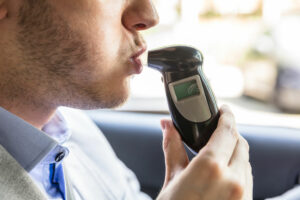
If you are pulled over and police suspect that you may be legally intoxicated, they’ll ask you to step out of the car to continue to traffic stop. Once you’re out of the vehicle, they may eventually ask you to submit to a breathalyzer to determine how much alcohol is in your system and if you’re over the legal limit. You may not want to hand police this evidence that could be used against you in court, but what are the consequences for refusing this test? We explain what happens after you refuse a DWI test in today’s blog.
Refusing A Breathalyzer In Minnesota
If you have a valid driver’s license in Minnesota, that means that you have agreed to follow certain rules and regulations on the road. One such condition is known as the “Implied Consent” law, which essentially states that driving is a privilege and that drivers must willingly submit to a breathalyzer test if an officer has reason to suspect that they are under the influence of alcohol. Of course police can’t force a person to submit, but the implied consent law is written in such a way that refusing to comply is a legal violation in and of itself. In other words, refusing to submit to a breathalyzer will bring about additional charges, and you still may be charged with driving under the influence.
Typically, a first-offense DWI with a BAC under 0.16 will result in a fourth-degree DWI, which is considered a misdemeanor offense. However, if your first offense involves a breath test refusal, your DWI may be upgraded to a third-degree DWI, which is a gross misdemeanor. This increased penalty is a statutory incentive to take the breath test, but that’s not to say that you should always comply with the breath test.
It should also be noted that while you’ll lose your driving privileges for a period of time if you are convicted of drunk driving, you’ll also immediately lose your license for at least a year if you refuse a breath test. You may be able to apply for a limited license during this time, but refusal will result in the loss of your driving privileges. Again, this doesn’t mean you should always blindly agree to testing.
We can’t sit here and say that you should always conduct the breath test or always refuse it, because that choice will be based on a number of individual factors. The one thing we will say is that before you take a breath test, your case has reached what is considered a critical juncture in which you are legally allowed to request to speak with a lawyer. Take this time to reach out to a criminal defense lawyer like Avery Appelman and the team at Appelman Law Firm. They can provide you with some advice for your specific situation or at least clear up your options if you are confused.
Refusing to submit to a breath test will bring about additional charges, but it can also hand police evidence that will be used against your during your DWI case. Take a moment and consult with an attorney before moving forward with a decision. To talk with a lawyer during this critical juncture, give our team a call today at (952) 224-2277.





